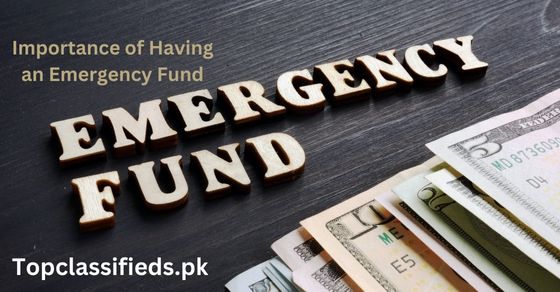The Importance of Having an Emergency Fund – Ultimate Guide

We all hope that we’ll never have to face unexpected expenses, but the truth is that they happen to everyone at some point. Whether it’s a job loss, unexpected medical bills, or natural disasters, unexpected events can significantly strain our finances. That’s why it’s essential to have emergency money.
An Emergency Fund is a savings account set aside expressly for unexpected expenses. It’s different from your regular savings account, which you may use for planned expenses like a vacation or a down payment on a house. Emergency money is there to protect you in unexpected financial emergencies.
Why Is An Emergency Fund Substantial?

- It provides a safety net in case of financial emergencies. Without an emergency fund, you may rely on credit cards or loans to cover unexpected expenses, which can add to your debt and increase financial stress.
- It helps you avoid dipping into your long-term savings. Your emergency money should be separate from your savings for long-term goals, like retirement or a down payment on a house. Withdrawing from these savings for unexpected expenses can set you back significantly.
- It gives you peace of mind. Knowing that you have emergency money can help you sleep better at night, knowing that you’re prepared for whatever life throws.
How Much Should You Have In Emergency Money?
The amount you should have in your Emergency Money can vary depending on your financial situation. However, experts typically recommend having at least three to six months’ worth of living expenses saved in your emergency fund.
The reasoning behind this is that, in a financial emergency such as a job loss or unexpected medical expenses, you will likely need a significant amount of money to cover your living expenses while you work through the situation. Three to six months’ worth of living expenses provides a cushion to ensure that you can protect your fundamental needs while you work towards resolving the emergency.
You should first calculate your monthly living expenses to determine how much you should have in your emergency money. It includes all your fixed costs, such as rent or mortgage, utilities, insurance, and transportation, as well as your variable expenses, like groceries and entertainment. Once you have a total monthly expense figure, you can multiply that by the month to cover your emergency fund.
For example, if your monthly living expenses are $4,000 and you want to have six months’ worth of living expenses in your Emergency Money, you would need to save $24,000.
It is a general rule of thumb, and your emergency money needs may differ depending on your financial situation. Some people feel more comfortable with more than six months of living expenses saved, while others may be able to get by with less. It’s also essential to consider the stability of your job, location, or other factors that could affect your financial stability.
It’s also important to remember that building an emergency fund takes time and effort. It will take time and effort to save enough money, but starting small and being consistent is vital. The key is to start as soon as possible and keep adding to it, and as soon as you have comfortable emergency cash, you will have peace of mind knowing that you’re prepared for whatever life throws your way.
How To Build An Emergency Fund?

Determine your goal:
The first step in Building an Emergency Fund is determining how much money you want to save. As mentioned earlier, experts recommend having at least three to six months’ worth of living expenses saved in emergency cash. Calculate your monthly living expenses and multiply them by the months you want to be covered in your emergency cash to determine your savings goal.
Set a timeline:
Once you have a savings goal in mind, setting a timeline for when you want to achieve it is essential. It will help you stay motivated and on track to reach your goal.
Create a budget:
Building an Emergency Savings requires saving money, so creating a budget allows you to set aside money for your emergency fund is essential. Identify areas where you can cut expenses and redirect that money towards your emergency cash.
Automate your savings:
One of the easiest ways to save money is to automate it. Set up automatic transfers from your checking account to your savings account regularly, such as bi-weekly or monthly. This way, you can build your emergency cash without thinking about it.
Look for ways to increase your income:
In addition to cutting expenses, look for ways to increase your income. It could include getting a side hustle, asking for a raise, or renting a spare room in your home. The extra income can go towards building your emergency fund faster.
Review and adjust your budget regularly:
Your budget and income might change over time, so review it regularly and adjust it accordingly. It will help you stay on track and ensure you can still save money for your emergency saving.
Be patient:
Building Emergency cash takes time and effort, so be patient and keep going even if you don’t reach your goal as quickly as you’d like. Remember, the most important thing is to start saving and be consistent with it.
Also, Read How to Make Money From Home with These Simple Tips in 2023
Conclusions:
In conclusion, an emergency fund is essential to a solid financial plan. It acts as a safety net for unexpected expenses, protecting you from having to rely on credit cards or loans in case of a financial emergency.
Experts recommend having at least three to six months’ worth of living expenses saved in emergency money. Building emergency savings can seem daunting, but it doesn’t have to be. Start by setting a small, achievable goal, and set a specific date to reach that goal. Create a budget that allows you to set aside money for your emergency cash, automate your savings, look for ways to increase your income, review and adjust your budget regularly and be patient.
With time, effort and patience, you can create a safety net for unexpected expenses and have peace of mind knowing that you’re prepared for whatever life throws.
Also Read: What is SEO – Search Engine Optimization? How to improve it?
